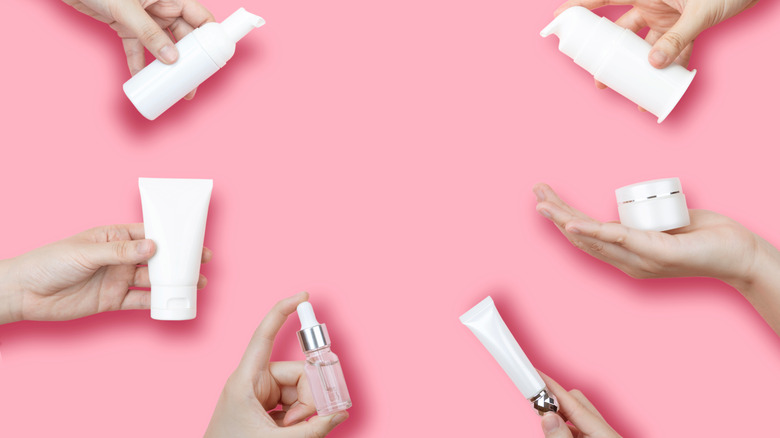The Skincare Products You Shouldn't Mix With Retinol
If you're looking to step up your skincare routine, there are plenty of new products on the market to choose from. Products like vitamin C, hyaluronic acid, and retinol all work in different ways to improve the texture, evenness, or clarity of your skin. And while it seems like more would be better, some of these products just don't work well together. So instead of wasting your money and possibly harming your skin, it's a good idea to know which products you can layer on and which you should avoid mixing.
Retinol isn't necessarily new, but its availability is much more widespread than it once was. A type of retinoid, retinol is typically used for anti-aging or acne treatment (via Healthline). It penetrates deep into the layers of skin to increase production of collagen and elastin, which are responsible for helping your skin look plump and full. This can reduce the appearance of wrinkles and lines. As an acne treatment, retinol works to keep your pores clog-free and prevent blemishes. Retinol can also act as a mild exfoliant to help improve skin tone.
Mixing these products could hurt your skin and your wallet
While retinol has plenty of benefits, it can also be irritating to the skin. That's why it's important to use it properly and not mix it with products that could cause a stronger reaction. One of the most dangerous products to with retinol is one that contain alpha-hydroxy acids or beta-hydroxy acids (via InStyle). Using these together can actually cause damage to your skin's moisture barrier. You could end up with red, irritated, dried-out skin unless you're careful to not use them at the same time. And if you do use both products in your routine, try not to use too much or apply them too frequently.
Another product to avoid layering with retinol is vitamin C. That's because together, they can cause increased skin sensitivity because of their exfoliating properties. Experts recommend using retinol at night and vitamin c in the morning to maximize their effects without causing irritation (via Healthline). And finally, if you just don't want to waste your money, forget using retinol with benzoyl peroxide. It turns out that the two ingredients can actually deactivate one another, making both essentially useless. If you do choose to use them, try applying them at opposite times of day.
No matter what you choose to put on your skin, it's always a good idea to consult a dermatologist to see if the product is necessary and the best one to achieve the outcome you're looking for.

